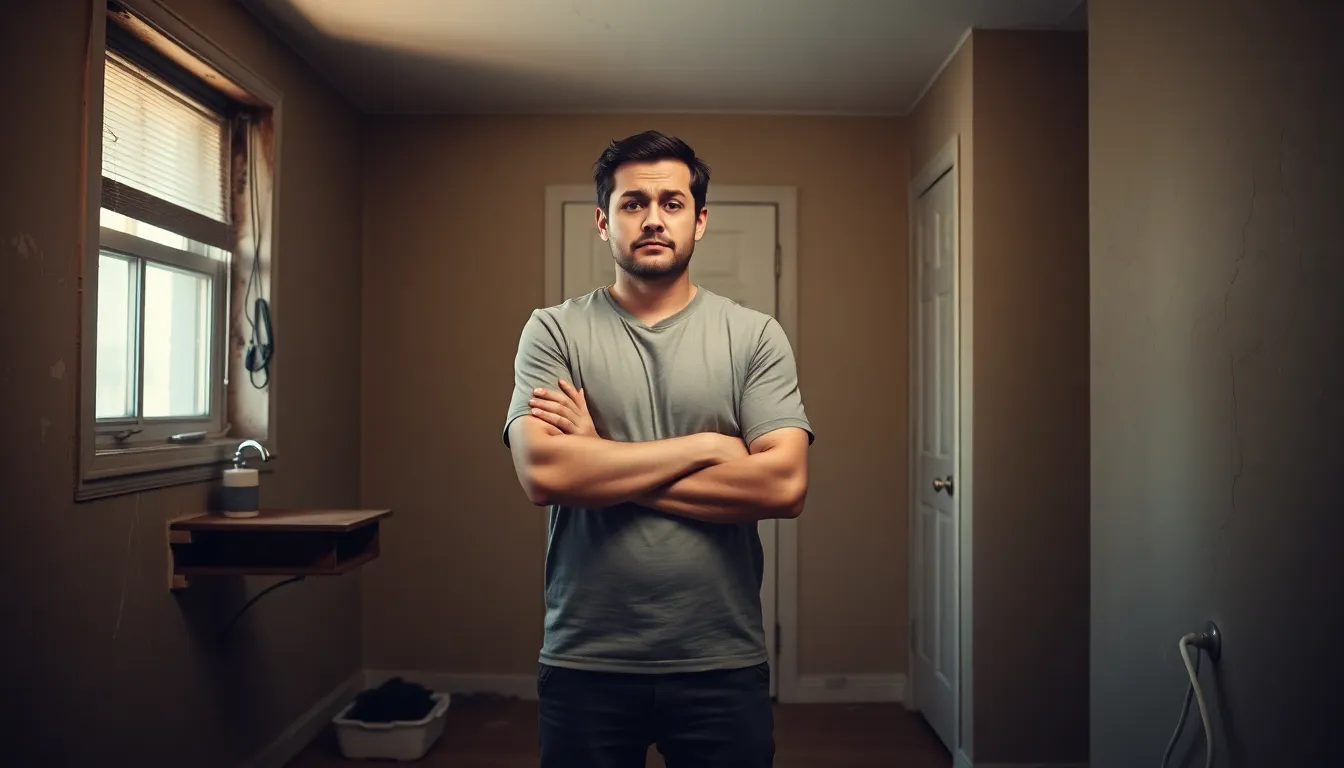When a leaky faucet becomes a gushing waterfall and the heating system decides to take a permanent vacation, tenants often find themselves in a sticky situation. The charming landlord who once promised to be a reliable steward of their home suddenly transforms into a master of avoidance, leaving tenants wondering if they’ve unwittingly signed up for a real-life episode of “Survivor: Apartment Edition.”
Landlord refusal to repair isn’t just an inconvenience; it’s a recipe for frustration. With every ignored request, the dream of a cozy living space drifts further away. Understanding the ins and outs of tenant rights and repair responsibilities can empower renters to tackle these challenges head-on. After all, no one should have to live with a home that feels more like a scene from a horror movie than a sanctuary.
Table of Contents
ToggleOverview of Landlord Responsibilities
Landlords play a crucial role in maintaining rental properties and ensuring living conditions remain safe and habitable. They must address issues such as plumbing failures, heating malfunctions, and structural defects promptly. Legal obligations require landlords to meet specific health and safety standards outlined in local and state laws.
Tenant rights establish that a landlord must respond to repair requests in a timely manner. Every jurisdiction specifies minimum requirements for property maintenance, which landlords must follow. Failing to perform necessary repairs can lead to legal consequences, exposing landlords to liability.
Consider what happens when essential repairs are overlooked. Mold growth from water leaks can cause health issues, and broken heating systems can make properties unlivable during cold months. Tenants may have the right to withhold rent or pursue legal action if landlords refuse to fulfill their repair obligations.
Understanding local laws helps tenants advocate for their rights effectively. Knowledge of how to document repair requests and track communication with landlords strengthens a tenant’s position during disputes. Effective communication is essential, and tenants should maintain records of all attempts to request repairs.
Overall, ensuring a safe and functional living environment remains the primary responsibility of landlords. Tenants should remain proactive in asserting their rights and holding landlords accountable, enabling them to enjoy a healthy and secure home.
Common Reasons for Landlord Refusal to Repair
Landlords may refuse to make necessary repairs for various reasons that affect tenants’ living conditions. Understanding these reasons empowers renters in advocacy for their rights.
Financial Constraints
Financial constraints emerge as a common reason landlords avoid repairs. Tight budgets can limit a landlord’s ability to allocate funds for maintenance and repairs. Significant expenses may also deter them from addressing smaller issues. When faced with economic challenges, some landlords prioritize other financial obligations over property maintenance. Yet, ignoring necessary repairs can lead to more costly problems later. This situation places tenants in a difficult position, as they rely on their landlords to provide safe and habitable living spaces.
Lack of Knowledge
A lack of knowledge regarding legal responsibilities contributes to landlords’ refusal to repair. Many landlords may not fully understand their obligations under local housing laws. Some might be unaware of tenant rights related to repairs and maintenance. Misinterpretation of legal requirements can lead to neglect in addressing urgent issues. It’s crucial for landlords to educate themselves about regulations to avoid legal consequences. Tenants benefit when their landlords recognize and fulfill these responsibilities, fostering a better rental environment.
Tenant-Related Issues
Tenant-related issues often influence a landlord’s willingness to make repairs. Complaints about tenants’ behavior can lead some landlords to become reluctant to invest in their properties. Renters who frequently request repairs may be perceived as problematic, causing landlords to ignore valid requests. Inconsistent communication from tenants can further complicate the situation. Yet, effective communication can help bridge the gap between landlords and tenants. Building a positive relationship encourages landlords to prioritize repairs, leading to improved living conditions for all involved.
Legal Rights of Tenants
Tenants possess important legal rights when facing landlord refusal to repair essential issues. Understanding these rights can empower renters and facilitate better communication with landlords.
Lease Agreement Implications
A lease agreement establishes the obligations of both landlords and tenants. It typically outlines requirements for repairs, maintenance timelines, and conditions for property upkeep. Failure to specify repair responsibilities can lead to disputes over obligations. Tenants should review their lease carefully to identify clauses that address repair requests. Enforceable provisions in the lease can provide tenants with a solid foundation for advocating necessary repairs. Additionally, documented communication regarding repair issues can be beneficial for future claims.
Local and State Laws
Local and state laws govern landlord-tenant relationships, specifying rights and responsibilities. These laws often require landlords to maintain safe and livable conditions in rental properties. For instance, many states mandate that landlords respond to urgent repair requests promptly. Understanding these regulations can significantly aid tenants in addressing repair issues. Tenants must research local housing codes to gain insight into legal requirements for repairs. Court rulings may also establish precedents that impact tenant rights and landlord obligations. Being informed about these factors enhances a tenant’s ability to ensure their living conditions meet legal standards.
Consequences of Landlord Refusal to Repair
Landlord refusal to repair essential issues significantly affects tenants, impacting their health, safety, and legal standing.
Impact on Tenant Health and Safety
Lack of timely repairs leads to serious health risks. Mold growth often results from unaddressed leaks, contributing to respiratory issues. Cold weather creates unsafe living conditions without functional heating, increasing the risk of hypothermia. The absence of basic safety features, like smoke detectors or secure locks, heightens vulnerability to accidents and crime. Tenants living in these circumstances often suffer emotional distress alongside physical harm.
Legal Repercussions for Landlords
Legal consequences arise when landlords neglect their repair responsibilities. Local housing codes enforce standards that landlords must follow. Tenants can file lawsuits for damages, seeking compensation for negligence. Courts may issue orders compelling landlords to fulfill their repair obligations. Repeated violations can lead to fines or even loss of rental licenses. Understanding these legal frameworks empowers tenants to pursue resolution effectively.
Tips for Tenants Facing Repair Refusal
Navigating a landlord’s refusal to make necessary repairs can feel daunting. Tenants can take several proactive steps to address the situation effectively.
Documenting Issues
Keeping thorough records is vital when facing repair refusals. Tenants should list all repair requests, including dates and descriptions of the problems. Photographs or videos can provide visual evidence of the issues, highlighting their urgency. Any communication with the landlord should also be documented, such as emails and text messages. This comprehensive approach strengthens tenants’ positions when advocating for repairs or pursuing legal action. Having organized documentation enables tenants to present a clear case if they need to escalate the matter to local authorities or court.
Communicating Effectively
Effective communication with landlords is essential for resolving repair issues. Tenants can start by clearly stating their concerns in writing, making sure to emphasize the impact of the repairs on their living conditions. Using polite yet firm language encourages a constructive dialogue. Regular follow-ups via email or phone can keep the issue fresh in the landlord’s mind. Including references to relevant lease terms or local housing laws may reinforce the request. Maintaining professionalism throughout the communication fosters a respectful relationship, increasing the likelihood of positive outcomes.
Conclusion
Facing a landlord’s refusal to make necessary repairs can be incredibly frustrating for tenants. Understanding tenant rights and local laws is crucial in navigating these challenging situations. By documenting issues and maintaining open communication with landlords, tenants can advocate for themselves more effectively.
It’s essential for renters to know their legal protections and the potential consequences for landlords who neglect their responsibilities. A proactive approach not only empowers tenants but also fosters a safer and more comfortable living environment. Ultimately, addressing repair issues promptly benefits both parties and helps maintain a positive landlord-tenant relationship.





